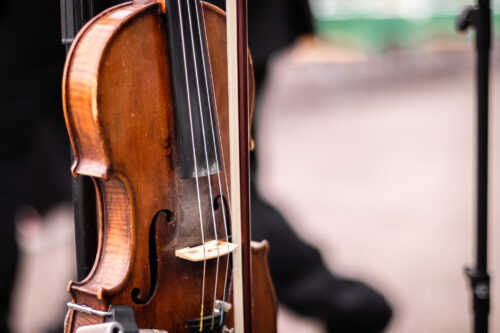Music therapy for Parkinson’s disease
The study “Singing with Parkinson’s” by pain researcher Dr. Günther Bernatzky from the Paris Lodron University of Salzburg and musicologist Dr. Katarzyna Grebosz-Haring from the Inter-University Institution “Science & Arts” of the University Mozarteum Salzburg and PLUS is entering its second round. The researchers are investigating the preventive and healing effect of combining music, singing and movement on Parkinson’s patients. The method will be incorporated in therapeutic treatment and help reduce the need for medication.
We all know how good it feels to hear a song we like on the radio. Music has been proven as an effective form of therapy in many applications. In terms of mental health, music helps to reduce stress, improve mood and behavioural disorders as well as reduce anxiety and depression. Music can also improve physical performance and reduce pain, even in patients with coronary heart disease. “These effects depend on whether and how music affects the individua,” says Professor Bernatzky. Psychological factors such as musical competence, physiological factors such as sensitivity and responsiveness, but also social aspects play a role.
Participants needed for the study
The study will be conducted in Salzburg and Vienna, with a total of 90 Parkinson’s patients taking part. The first 38 patients have already completed the study in January 2023, and now a second round is to take place.
The patients will be randomly divided into three groups: One group will listen to a therapeutic music CD once a week, the second group will form a choir that will receive singing lessons and rhythmic movement once a week, while the third group will participate in the study without any activities. The study will last 12 weeks. All participants are welcome to join the choir and movement sessions, which will continue after the end of the study. “The first group of participants thoroughly enjoyed the choir and CD,” emphasises Katarzyna Grebosz-Haring. The scientists are expecting to see results from the choir sessions, which combine rhythmic movement and targeted breathing. “We are convinced that this has a positive effect on the majority of patients,” says Grebosz-Haring. Social interaction is also an important factor, as Parkinson’s patients are more likely to develop depression. The biggest hurdle is to get motivate people to take part in the study, as it is hard to reach those who are particularly isolated. “Our big goal is to reduce medication through this music therapy,” says Professor Bernatzky. In addition, the team hope to produce a set of guidelines and recommendations to incorporate in therapy treatments.
“We see our treatment method as a no-medication, joy-bringing supplement.”
The effect of music and singing is measured using saliva samples taken from the participants themselves, which is used to determine cortisol and alpha-amylase levels. The procedure is simple, easy to carry out and much less complicated than taking a blood sample. In addition, patients will be asked about their artistic interests, feelings of stress and well-being. There is some evidence that stress can worsen Parkinson’s symptoms, says Grebosz-Haring. Therefore, it is particularly important to increase dopamine levels, colloquially known as the happy hormone, which has been proven to reduce stress. Dr Klaus-Dieter Kieslinger from the private clinic Wehrle-Diakonissen and Dr Caroline Thun-Hohenstein from the private clinic Confraternität in Vienna will oversee the medical side of the study. The biological analyses will be carried out by Univ. Prof. Dr Urs Nater from the University of Vienna. The project is funded by the Inter-University Institution “Science & Arts” of the Paris Lodron University Salzburg and the Mozarteum University as well as the Province of Salzburg.
“We know that we cannot cure people with music,” says Professor Bernatzky. However, when used as a complementary treatment method, it can significantly improve the quality of life and well-being.
Information:
Participation in the study is free of charge. Travel expenses will be reimbursed.
Those interested can register at:
Contact:
Professor Dr. Günther Bernatzky |
Dr. Katharina Grebosz-Haring |
Department of Art History, Music and Dance Studies
Tel.: +43 662 8044 2370
Further information can be found here (in German): Chorgesang bei Patient/innen mit Parkinson – W-K (plus.ac.at) | www.kieslinger-neurologie.at





